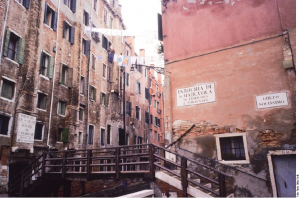VENICE AND THE GHETTO A Prestigious Culture and History
The presence of Jewish people in the land that would have become the Republic of Venice dates back several centuries. Over time, the Jews had turned to be a relevant core of Venice, which was the commercial crossroad between East and West. In 1516, the Serenissima chose to settle the presence of Jews through a decree that limited them in a well-defined area of the city. Venice was the birthplace of the first Ghetto in Europe; it also gave birth to a world, “ghetto”, that we currently use to indicate all the forms of exclusion. Nevertheless, the Ghetto of Venice was also cultural melting pot. Thanks to the flourishing of printing works in Hebrew, for example, Venice became a relevant publishing center in Europe and one of the most important cities in the Jewish cultural context of that time. Even today, the Ghetto is not just a symbol of the Jewish History, but is also the set of a wide range of activities aimed at promoting the Jewish history, culture and tradition.
As a relevant point of reference, the Jewish Community of Venice is actively involved in the cultural field, also through the promotion of projects of great interest. Past and present dissolve in a common flow, which is marked by a transition made up of history, art and culture.
The Venice Ghetto is 500 years old this year: this is an opportunity to have a deep knowledge of its historical, artistic, literary, philosophical heritage. In 2016, the Jewish Ghetto will be the set of a series of shows and projects addressing national and international subjects, staring from the history of the Jewish Community in Venice. There has always been a close cooperation with the Jewish Community. In 2012 the travelling exhibition “Gli Ebrei a Venezia 1938-1945. Una Comunità tra persecuzione e rinascita – The Jews in Venice 1938-1945. A Community between persecutions and rebirth” was a careful thought to celebrate an historical experience that is not to be forgotten.
The Ghetto’s history reflects to a large extent the history of Venice itself, highlighting the strength and the courage of a Community which have been very important for the Republic of Venice. I hope the memory of the historical events that marked the history of the Ghetto of Venice will serve as a basis to reflect about the reality that surrounds us.
*Luca Zaia is the governor of the Veneto Region. This article has been translated by Isabella Favero, student at the Scuola superiore interpreti e traduttori di Trieste, who is doing her apprenticeship in the newsroom of Pagine Ebraiche.

